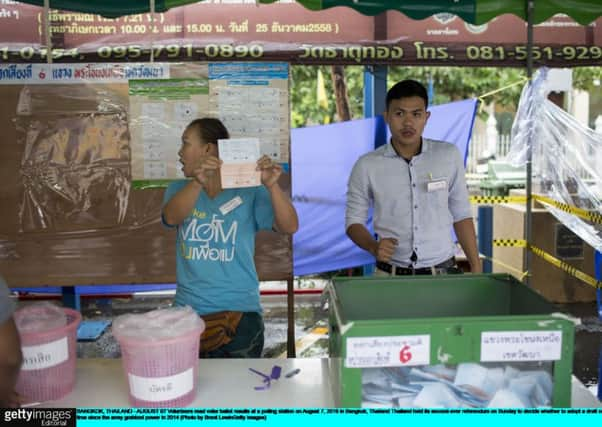Thai voters approve junta-backed constitution


With 91 per cent of the ballots counted, 62 per cent of voters in the referendum said they approved of the new constitution, while 38 per cent rejected it, Election Commissioner Somchai Srisutthiyakorn said.
The referendum was seen as a test of the popularity of the military government of Prime Minister Prayuth Chan-ocha, a retired army general who has severely curtailed dissent since coming to power in a 2014 coup. But his rule has also brought a measure of stability and ended the frequent street violence and divisive politics that had frayed Thailand’s social fabric for years.
Advertisement
Hide AdAdvertisement
Hide AdThat veneer of stability could help explain the “yes” vote for the new constitution.
In addition to asking for an opinion on the constitution, the referendum also asked a supplementary question on whether voters wanted an appointed Senate to choose a prime minister. That question elicited a less enthusiastic approval - 58 per cent “yes” and 42 per cent “no,” Somchai said.
Although no irregularities were reported in the voting process, critics are likely to point out that the “no” camp was denied the opportunity to present its case.
The junta imposed severe restrictions in the run-up to the referendum, banning political rallies, independent campaigns and open discussion about the draft constitution. Criticism of the draft was made punishable by 10 years in jail. Critics say the restrictions ensured that most people were unaware of the pitfalls of the charter, and were probably anxious to get the long-drawn process over with so that they could move on.
There was also the allure of new elections that Prayuth has promised to hold in 2017, after the approval of the new constitution, although he’s said he would call the vote even if the referendum was defeated.
Some 50 million voters were registered for the referendum, but only about 55 per cent of them voted, Somchai said.
Analysts had said that a “yes” vote would be a setback for democracy in Thailand.
“If you say `yes’ to the constitution, it means you agree with the content of the constitution ... what makes matters worse is you also give legitimacy to the coup, to the coup makers,” Pavin Chachavalpongpun, an associate professor at the Centre for Southeast Asian Studies of Kyoto University in Japan, said on Friday.
Advertisement
Hide AdAdvertisement
Hide AdPavin, a Thai and a vocal critic of the junta, said that a victory in the referendum would give the junta the reason to tell the world “don’t you dare criticise us any more because we have the legitimacy.”
The main criticisms of the draft constitution are:
- A transition period of at least five years to civilian rule.
- A 250-member appointed Senate that includes the commanders of the army and other security services.
- A deadlock in the 500-member elected lower house could trigger a selection of a prime minister who is not an elected member of parliament. Under the abolished 2007 constitution, half the Senate was elected, and the prime minister had to come from the lower house.
- Emergency decrees enacted by the junta without any parliamentary consent remain valid.
Thailand has endured 13 successful military coups and 11 attempted takeovers since it replaced an absolute monarchy with a constitutional one in 1932. This would be Thailand’s 20th constitution.
Leaders of the latest coup say frequent political conflicts had made the country ungovernable and that military rule was necessary for stability. The junta set up hand-picked committees to draft a charter that would enshrine its declared goal of reforming politics by eliminating corruption.
But others believe the new constitution has a different aim: to weaken allies of former Prime Minister Thaksin Shinawatra, the central figure in the roiling of Thai politics.